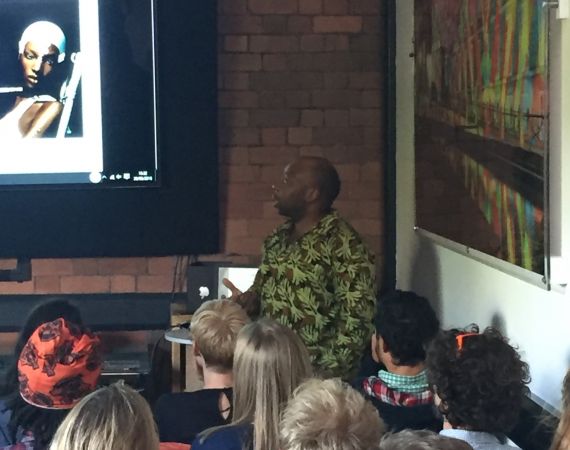Lunchtime talk write-up
Posted on Thu 24 Nov 2016
Beyond the Binary: Adventures in Space Travel
Edson Burton is the Studio's 2016 Artist in Residence. His recent Lunchtime Talk outlined his new work being developed through the residency.

Posted by
Edson Burton is an historian, writer, programme-curator and performer. He recently commenced his period of time with the Studio as our 2016 Artist in Residence, and in a recent talk, he outlined the initial inspiration, thoughts and aspirations for a work he's developing under the name The Last Blues Song for a Lost Afronaut. During this talk I learned the following five things:
1. Edson needs a hero!
Edson listed the comic book series Luke Cage and Black Panther as staples of his youth, but far from the hero he thirsted for, these depictions never strayed far from street-level and noble savage tropes. Elsewhere in the media, there were common themes of white protagonism and Blackness denoting sinister or savage intentions. These specific depictions fostered a double-consciousness (citing Du Bois' publication, The Souls of Black Folk), or, a sensation of feeling as though his identity was divided into several parts, making it difficult or impossible to have one unified identity.
2. Enter Afro-Futurism!
Edson recalled his experiences of growing up in Thatcherite-culture, and his memories of the provocation of discourse around the Black diaspora. "There ain't no Black in the Union Jack". Racial politics created a divide amongst the Black community, and Edson remembers internalised racism and the 'are you Black enough?' policing of identity within Black communities. Whilst some groups believed in the importance of realism, Edson felt compelled to imagine an end goal, an optimistic future. Joining the ranks of the Afro-Futurists, including composer Sun Ra, he started reappropriating the undercurrents of slave histories, of exodus and flight, to project a new world and a chance to experience alternative realities.
3. What if...?
A pivotal question Edson has is about binary - or a lack thereof, and this wonder contributed to the development of the idea for The Last Blues Song of a Lost Afronaut. What if Blackness wasn't based on a reaction? What if everybody looked the same? Are you aware of your race or identity if you are not aware of 'otherness'. How might a history devoid of slave culture or rascism recalibrate the Black community? What afro-syncretic cultural forms could arise...dance, religion, art and fashion? These complex questions, he felt, could only be appropriately analysed through an Afro-futuristic story.
4. The story flips everything you know on its head.
The story will follow a space explorer, or Afronaut, named Femi who belongs to a Black colony that congregated in a post-humanity mission long after the earth's collapse and demise. In a lifetime she has never known anything other than Black faces, and Black culture, which is why it is such a pivotal event when she discovers records of a previous, multi-cultural world, connecting her with a long-departed young white girl. Femi questions why no one came with them to recolonise.
5. How will the Studio help Edson succeed?
Edson has already collaborated with some fantastic artists to imagine Femi's clothing and spaceship, based on traditional African beadwork and native dress. Edson hopes these initial ideas can be created in the tech-aware environment of the Studio to develop tangible futuristic outcomes. In regard to narrative, Edson wants to think about the themes of leaving people behind, the breaking of relationships on earth, the ritualising of societal tensions and the rights of passage. He hopes to invest in new technologies for the work, working with residents who are already utilising their audiences as passengers, virtual reality and digital mapping. He will spend time assessing participation and immersion vs. imagination.
Overall, he hopes this work will create conversations, to create a world fit for play and exploration amongst aspiring Afro-Futurists, and others exploring questions of identity, mythology and alternative worlds.
We cannot wait to see the finished outcome!
